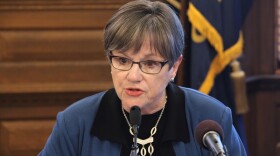-
Advocates say the leaked budget cuts, if implemented, would undo decades of progress for the rights of people with disabilities.
-
Kansas is one of only a few states with no legal medical or recreational marijuana. Some people are optimistic about a medical cannabis deal this year.
-
The GOP-controlled Kansas Legislature is on a collision course with Democratic Governor Laura Kelly. The two sides have differing views on tax cut proposals as well as private school funding and transgender issues. KPR's Jim McLean sits down with the governor to talk about her views.
-
A new documentary, still in production, takes an in-depth look at climate change in Kansas. Produced by Dave Kendall, of Prairie Hollow Productions, the documentary features interviews with farmers, ranchers, policymakers and other stakeholders.
-
Hundreds of workers have been hustling around the clock to recover the oil. Some landowners want more information about the cleanup and about why the pipeline broke.
-
Record-setting lack of rain in 2022 transformed parts of western Kansas into a temporary desert. And it'll take a while for the region's fields, towns and mindsets to recover.
-
With Senate Bill 65, Kansas joins several states where abortion opponents want to give local governments the authority to restrict or ban abortion.
-
Two pipelines, including the Keystone that ruptured on Dec. 7, are the most important local sources of tax revenue for Washington County
-
A landslide vote last year kept abortion legal in Kansas, but now the fight continues in the Statehouse — where abortion opponents have already introduced legislation that would further restrict access.
-
After decades of irrigation, the aquifer that makes life possible in dry western Kansas is reaching a critical point. Several counties have already lost more than half of their underground water. But a new plan could save more of what’s left.
-
Kansas has more than $2 billion in budget surplus. The Republican-controlled Legislature and Democratic Gov. Laura Kelly may use the 2023 session to spar over how that money can be used through tax cuts and government spending, among other political issues.
-
Water experts are warning that farmers and ranchers in western Kansas must stop pumping so much water out of the Ogallala Aquifer. The warning is setting up a big and messy fight in the Kansas Legislature this year.















